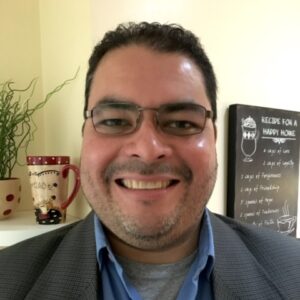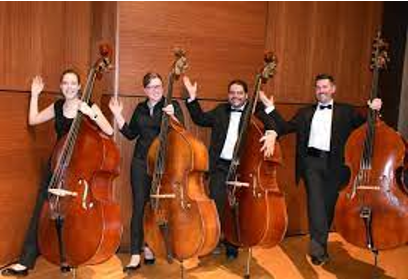
Got Rhythm? Let’s Play! How the Symphony Makes Me a Better Teacher
A couple of years after joining the faculty at Concordia Seminary, I decided to audition for the Saint Louis Civic Orchestra, a community orchestra made up of professional, semiprofessional, and accomplished amateur musicians from the greater St. Louis metropolitan area. My training on the double bass goes back to my middle-high school years at the conservatory in Panama City, Panama, where I had my first orchestral experiences.
Coming to the US for high school and undergraduate studies still afforded me opportunities to play in concert and jazz bands and take double bass lessons. That changed with graduate studies. The pressures of performing well in school in a foreign language, increasing time constraints due to important family and work obligations, and very few chances to play the instrument in ecclesial settings led to a period of decline in creative engagement with music.
Not an uncommon problem among graduate students and teachers of theology and religion, I spent so much time focusing on the True and the Good that I ignored the Beautiful. By the time I started my first job at the seminary, Beauty had become the Cinderella of my life: Truth and Goodness made it to the Ball. Beauty got left behind.
And my life was the poorer for it. But joining the symphony carved out a space once again in my life for the gift of play. What is play but the habit of reveling in the beauty of God’s creation, delighting in its colors, sounds, aromas, tastes, and textures? Being alive in the body! Being engaged by the senses! The symphony became my playground in the theater (better yet, in the concert hall) of God’s creation.

So, where’s your playground? We all need one. When I talk to my seminary students about the place of play in life, I frame our conversations in the context of the need to establish a rhythm in life. Got rhythm? Yes, a rhythm, just like in music! A regular, steady, habitual pattern of sound and movement in which we live, and move, and have our being.
I use the Genesis story to show that humans were not only created for movement and labor, but also for repose and sabbath rest. The first day of creation already sets a rhythm for life on earth, evening and morning—what Dietrich Bonhoeffer calls the dialectic of creation. Yes, we were created to be responsible stewards of our gardens. But we were also made to be thankful stewards who carve out time to stand still and delight in the Creator’s handiwork.
As in music, there is in life a time for sound, a time for silence, and a time for play. Indeed, sound, silence, and play in music may be seen as extensions or embodiments of the musician’s own rhythm of movement, rest, and delight. Music imitates, breathes life. Getting into the rhythm of the orchestra reminds me of the need for rhythm in my own life as a teacher. It reminds me to ask myself: How do I embody in the classroom not only a strong work ethic, but also a restful presence, and a joyful wonder about God’s world?
In conversations with students, I use the metaphor of the garden, the mountain, and the playground. We were created for the garden and the mountain, for labor and rest. Rest includes time with God in prayer, praise, and thanksgiving. Ora et labora, work and pray, as the monks proclaim. Rest also includes literal rest, especially sleep. Had enough sleep lately?
Busy teachers tend to be quite knowledgeable and hands on when it comes to the gardens they are called to tend to. But it can be quite difficult to find that mountain to retreat to amid piles of papers to grade, articles to write, and meetings to attend. It can be just as hard to find time for the playground, for cultivating curiosity and wonder in the beauty of God’s creation.
Playing in the symphony has become that creative space between work and rest for me. Like playing the double bass in the symphony, play involves practice, honing a craft, activity, movement. You can’t exactly wing a symphony! And yet weekly practices with the symphony do not feel like regular everyday work. They are more like oases of refreshment in the desert. And more than that, they are like being in a workshop where you imagine and experiment together with sounds, bowings, fingerings, rhythms, and colors to make something beautiful together.
The symphony reminds the teacher in me to see my activity and time with students not only in terms of fulfilling a task, but in terms of finding and embodying a rhythm that allows for time in the garden, the mountain, and the playground. Like playing with colleagues in the symphony, life with students is a creative endeavor that glorifies the Creator and enriches all our lives with beauty in ways that allow us to do things together with curiosity, imagination, and delight. Got rhythm? Let’s play!
Leave a Reply